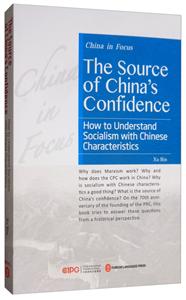-
>
(精)颤抖的镜头:卡帕二战回忆录(花口本)
-
>
(精)颤抖的镜头:卡帕二战回忆录
-
>
中国的民主
-
>
中华人民共和国六十年实录(套装共10册)
-
>
百年潮·中国梦(英文版)
-
>
新书)社会主义发展简史(大字本)
-
>
改革开放简史
如何看中国中国为什么自信:如何看中国特色社会主义(英文) 版权信息
- ISBN:9787119120881
- 条形码:9787119120881 ; 978-7-119-12088-1
- 装帧:一般胶版纸
- 册数:暂无
- 重量:暂无
- 所属分类:>>
如何看中国中国为什么自信:如何看中国特色社会主义(英文) 内容简介
世界上总是有些人对中国有各种质疑,但我们中国人民经过70年的奋斗和探索,找到了自己成功之路,我们叫它中国特色社会主义。中国有自己的魅力,中国的经验也与西方迥然不同,中国特色社会主义有着适合中国发展的优势。本书从“中国道路”、“中国理论”、“中国制度”、“中国文化”、“中国模式”五个部分,以一个个生动的案例,用浅显朴实的语言,讲述如何看中国特色社会主义的优越性,告诉世界和海内外读者:中国为什么自信。
如何看中国中国为什么自信:如何看中国特色社会主义(英文) 目录
Chapter 1 China's Path: The Road to Achieving a Major Country's Prosperity
The Foundations: Looking to the Soviet Union as a Lesson and Forging Our Own Path
Pioneering: Blazing a Trail
Going Further: A New Path of the Market Economy
A New Chapter: The Ripple Effects of the Belt and Road Initiative
The Prospect: Realizing the Dream of Becoming Strong
Chapter 2 Chinese Theory and Its Leading Role in the Nation's Rejuvenation
A Book Lights a Spark
"We Can Develop a Market Economy Under Socialism"
Reform Is China's Second Revolution
China's Greatest Priority Is Its People
Fighting for Self-Revolution
Green Mountains and Clear Waters Are Invaluable Assets
……
Chapter 3 The Chinese System: The Power of Protection in Social Development
Chapter 4 Chinese Culture Is the Spiritual Power of the Chinese Nation
Chapter 5 China's Initiative to Share Its Wisdom with the World Postcript
如何看中国中国为什么自信:如何看中国特色社会主义(英文) 节选
《中国为什么自信:如何看中国特色社会主义(英文)》: Chinese people have a historical claim to the Silk Road,as China was where the route originated and gave rise to the convergence and dissemination of Eastern and Western cultures - a confluence that would offer later generations a model for mutually beneficial cooperation. The seeds of such a peace were sown in the Ming Dynasty, when Chinese explorer Zheng He set off on his famous seve'n voyages, leaving a sense of friendly relations with the 30 plus countries he encountered along his route. In early modern times, however, China was isolationist in its attitude and overly confident in its own abilities. Our ancestors suffered a setback, and the country had to taste the bitter consequences ofits "closed-door policy", which ultimately led to China's poverty, lack of development, ignorance, and near demise. After the founding of the PRC, and since the beginning of reform and opening up, China's road has become ever wider.It has given the Chinese people a valuable lesson - the road to success cannot be built with an isolationist or reactionary mindset. China will only be understood by other nations if it engages with the world, which will in turn lead to mutual development and "win-win" results for both sides. As it has progressed along its path, China has gone from setting up Special Economic Zones to opening up coastal cities,river regions, and border areas, and eventually implementing all-around opening up. It has seen the successful conclusion of the APEC meeting and its own accession to the WTO.Through attracting foreign investment and doing business overseas, the country's road to opening up is getting more spacious. As the pace of this process gets faster, the road is having a far-reaching influence around the world. ……
如何看中国中国为什么自信:如何看中国特色社会主义(英文) 作者简介
徐斌(Xu Bin),A professor and doctoral supervisorat the School of Marxism, BeijingNormal University, and director ofthe university's Research Center ofMarxist System and Theory, Xu Binalso serves as a lecturing expert for acourse organized by the PublicityDepartment of the CPC Central Com-mittee and Guangming Daily: "100classes on core socialist values". He is areview expert for the National SocialScience Fund of China, and a keymember of the Marxist TheoryResearch and Development Programof the CPC Central Committee. Hispublications include Why China'sReform Can Succeed and A RationalChoice.
- >
上帝之肋:男人的真实旅程
上帝之肋:男人的真实旅程
¥19.3¥35.0 - >
烟与镜
烟与镜
¥20.6¥48.0 - >
李白与唐代文化
李白与唐代文化
¥9.9¥29.8 - >
唐代进士录
唐代进士录
¥19.1¥39.8 - >
人文阅读与收藏·良友文学丛书:一天的工作
人文阅读与收藏·良友文学丛书:一天的工作
¥18.3¥45.8 - >
【精装绘本】画给孩子的中国神话
【精装绘本】画给孩子的中国神话
¥17.6¥55.0 - >
莉莉和章鱼
莉莉和章鱼
¥18.1¥42.0 - >
随园食单
随园食单
¥20.6¥48.0
-
中国宫廷政治
¥12.5¥29 -
中国古代专制主义的政治学分析
¥11¥29 -
中国为什么要改革-思忆父亲胡耀邦
¥24.5¥48 -
当代中国政治思想史
¥9.9¥31 -
中国科举史话
¥6.4¥20 -
关于深化项目评审.人才评价.机构评估改革的意见
¥1.1¥2.2
















